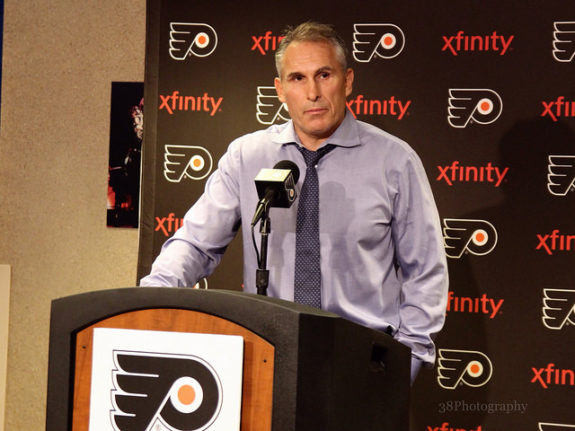Approximately a year ago, the St. Louis Blues fired head coach Mike Yeo and replaced him with Craig Berube on an interim basis. Last in the standings and in desperate need of a change, the team needed fresh leadership. Not many people thought that personnel change would lead to a Stanley Cup. Who was this new leader and why was his style so successful?
Berube – The Player
Signed as an undrafted free agent by the Philadelphia Flyers on March 19, 1986, Berube made his NHL debut about a year later against the Pittsburgh Penguins. He racked up 16 penalty minutes including two fighting majors in the 3-1 win. He remained with the Flyers through the season and played with them the next two seasons. As the enforcer, Berube landed on the top-10 list in penalty minutes for those seasons.
Following the 1990-91 season, Berube was traded three times in seven months. He had stints with the Edmonton Oilers, Toronto Maple Leafs and Calgary Flames. On June 26, 1993, he was traded to the Washington Capitals where he played the next six seasons including playoff games in their 1997-98 season run to the Stanley Cup Final.
Berube returned to the Flyers at the trade deadline (from ‘Capitals Trade Hunter, Juneau, Berube’, Washington Post, 03/24/1999) and remained with them through the season and into the playoffs. The next three seasons he spent time with the Capitals, New York Islanders and Flames. His playing career came to an end during the 2003-04 season as a player-assistant coach for the Philadelphia Phantoms (Flyers’ American Hockey League affiliate).
In his 1,054 NHL regular-season games played, Berube acquired 3,149 penalty minutes, which earned him seventh place on the all-time penalty minutes list.
Berube – The Coach
Although named head coach of the Phantoms prior to the 2006-07 season, Berube ended up as the assistant coach of the Flyers after a major reorganization in the front office. He returned to the Phantoms as head coach for the 2007-08 season and the five seasons that followed.
After an abysmal 0-3-0 start to the 2013-14 season, the Flyers fired Peter Laviolette and promoted Berube to head coach. The team improved under him and clinched a spot in the playoffs that season. Following a disappointing 2014-15 season, he was relieved of his position with the Flyers.

On June 29, 2016, Berube was named head coach of the Chicago Wolves (Blues’ AHL affiliate at the time) and landed them a spot in the Calder Cup Playoffs, finishing the regular season tied for second-most points in the league. Players on that team included Zach Sanford, Jordan Binnington, Sammy Blais, Vince Dunn and Ivan Barbashev.
About a year later, the Blues named Berube assistant coach where he remained until Yeo was fired on Nov. 19, 2018. We know how the season ended.
Blues Chief
Under Yeo’s leadership, the team was discombobulated and literally fighting with each other. There was much disdain in the locker room and a turnaround for the season seemed nearly impossible.
How was Berube going to make the team better and fix these issues? “Definitely got to instill some confidence back into this hockey team,” Berube said in a press conference following the announcement of his new position on Nov. 20, 2018. “It’s a good hockey team. We got good players and we got to get moving in the right direction.”
Berube’s rule was not an instant success. The team struggled through the rest of the year and by the first of the new year had the worst record in the NHL at 15-18-4. Then something sparked. They started to win and earned a franchise-record 11-game winning streak from the end of January through the end of February. It was a totally different team.
General manager Doug Armstrong spoke of Berube as a man of few words who gets his message across fairly, but everyone knows where they stand with him. “The players enjoy playing for him,” he said in an interview on Feb. 27.
The team clearly had a purpose and played with more intensity after Berube took the helm. He encouraged them to play better and demanded confidence from them. His playing style flowed into his coaching style. His tough approach and hockey knowledge motivated the players to play for each other.
The rest is history… literally. With a 38-19-6 regular season record as interim head coach, Berube led the team to their first-ever Stanley Cup championship. As well, he is of First Nations (predominant indigenous peoples in Canada) descent and the first NHL coach of First Nations descent to win a Stanley Cup.
He was very proud to take the Cup back to his hometown in the offseason. They praised and honored him upon his return.
Blues Make it Official, and Where They’re at Now
In addition to winning the Stanley Cup, Berube was named as a finalist for the Jack Adams Award. Although he didn’t win, Armstrong showed faith in Berube by signing him to a three-year contract as head coach.
The Blues continue their success this season just two points behind the conference leading Edmonton Oilers and three points ahead of the Dallas Stars in the Central Division.
Even with injuries and other adversities, the Blues continue to win. Although he never wore the ‘C’ as a player, Berube is truly the captain behind the bench. He has steered this team to victory and continues to guide them in the right direction.